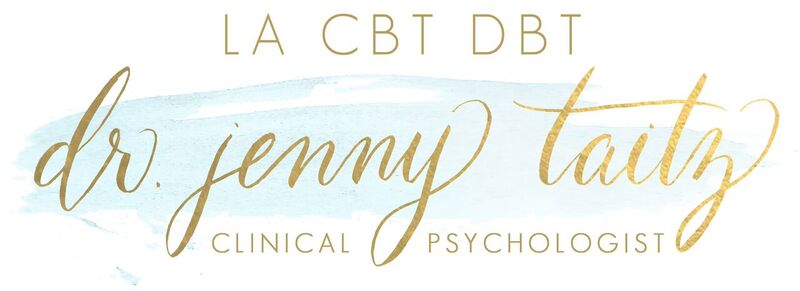 Cognitive Behavioral Therapy (CBT)
Cognitive Behavioral Therapy (CBT)
Cognitive behavioral therapy, developed in the 1960’s by Aaron Beck, M.D., a professor emeritus at the University of Pennsylvania, describes a particular method of understanding problems you may face and also treating your symptoms.
Often, the way you feel has a lot to do with the way you think and your actions. Unlike traditional therapies where you spend a lot of time learning about your past, in CBT, you develop practical tools to cope with the present.
What problems may I approach using CBT?
CBT is a scientifically supported treatment for a wide range of problems including anxiety disorders, mood disorders, and eating disorders. Many people who struggle with problems with sleep, procrastination, and self- esteem find CBT remarkably helpful. All of the therapies described below fall under the umbrella of CBT.
 Dialectical Behavior Therapy (DBT)
Dialectical Behavior Therapy (DBT)
Marsha Linehan, a professor at University of Washington, developed Dialectical Behavior Therapy (DBT) to teach people how to manage emotions which feel overwhelming. She noticed pushing people to change wasn’t as effective as teaching people to both change and accept at the same time. This treatment synthesized elements
from her years as both a behavioral therapist and a student in the Zen tradition.
Some people experience emotions more deeply than others. If you have never been taught how to accept or attend to your feelings, you may also experience emotions more intensely. DBT has taught thousands of people throughout the world how accepting emotions can help regulate emotions. If you find your emotions to operate almost like a light switch with an “on” or “off” switch, DBT will help you learn to modulate your feelings the way a light dimmer does, by teaching you practical skills. Briefly, DBT skills include the following:
Mindfulness – A “core” DBT skill, mindfulness involves paying attention, in the moment, non- judgmentally in order to live your life in a deliberate manner.
Emotion Regulation – This skill helps you learn the function of emotions and improve your ability to describe, change, and cope effectively with them, rather than let emotions control you.
Distress Tolerance – This one helps you manage crises without making your problems worse.
Interpersonal Effectiveness – And this skill teaches you to attend to your needs and improve your relationships.
Initially, DBT was created to help individuals who struggle with engaging in self harm and suicidal behavior due to emotional pain. Many world renowned psychiatric hospitals now teach DBT to their patients. Research studies comparing DBT to other reputable treatments have found DBT to be helpful in the treating individuals who struggle with emotions, self harm, binge eating, bulimia, and depression (e.g. Linehan, 1993; Telch,
Agras, & Linehan, 2001; Wisniewski, Safer, & Chen, 2007; Lynch et al., 2003). DBT has also been applied to address marital difficulties (Fruzzetti, 2006). In my clinical practice, I teach elements from DBT when appropriate even to people who do not struggle with notable difficulties with emotions though want to live more effectively and they invariably remark on how beneficial they find DBT skills.
 Acceptance and Commitment Therapy (ACT)
Acceptance and Commitment Therapy (ACT)
ACT is a treatment developed by Steven Hayes at the University of Nevada, Reno, and his colleagues Kirk Strohsahl and Kelly Wilson. ACT teaches people to become psychologically flexible, to let go of rigid patterns, and to build a life they chose, rather than a life based on avoiding or fighting their feelings. ACT is about allowing yourself to experience negative emotions if they arise while moving towards what matters to you.
Many unwanted experiences, including thoughts and feelings, can’t be controlled but you can commit to actions that keep you living in line with your personal values. Like DBT, ACT has been researched extensively, and has been found remarkably helpful in treating a wide range of psychological problems. Recently, ACT has become increasingly applied toward the area of body image and eating (Pearson, Heffner, & Follette, 2010; Sandoz, Wilson, Dufrene, 2011).
 Mindfulness Based Cognitive Therapy (MBCT)
Mindfulness Based Cognitive Therapy (MBCT)
This is a program developed by Zindel Segal at the University of Toronto and his colleagues Mark Williams and John Teasdale (2002). The treatment is strongly influenced by Kabat-Zinn’s Mindfulness Based Stress Reduction Program (2005) and teaches people to practice mindfulness to get out of repetitive, distressing, mental loop tapes that are common in people who struggle with depression. After completing MBCT treatment, subjects drastically reduce their risk of falling back into an episode of depression (Segal, Williams, & Teasdale, 2002). MBCT is as effective as an antidepressant in preventing relapse (Segal et al., 2010). You may think of mindfulness as a medicine you can create through mental exercises.
In my practice, I weave together both the philosophical underpinnings as well as practical exercises from the aforementioned treatments in order to teach people (of all ages, with a wide range of difficulties) to cultivate compassion and wisdom.
